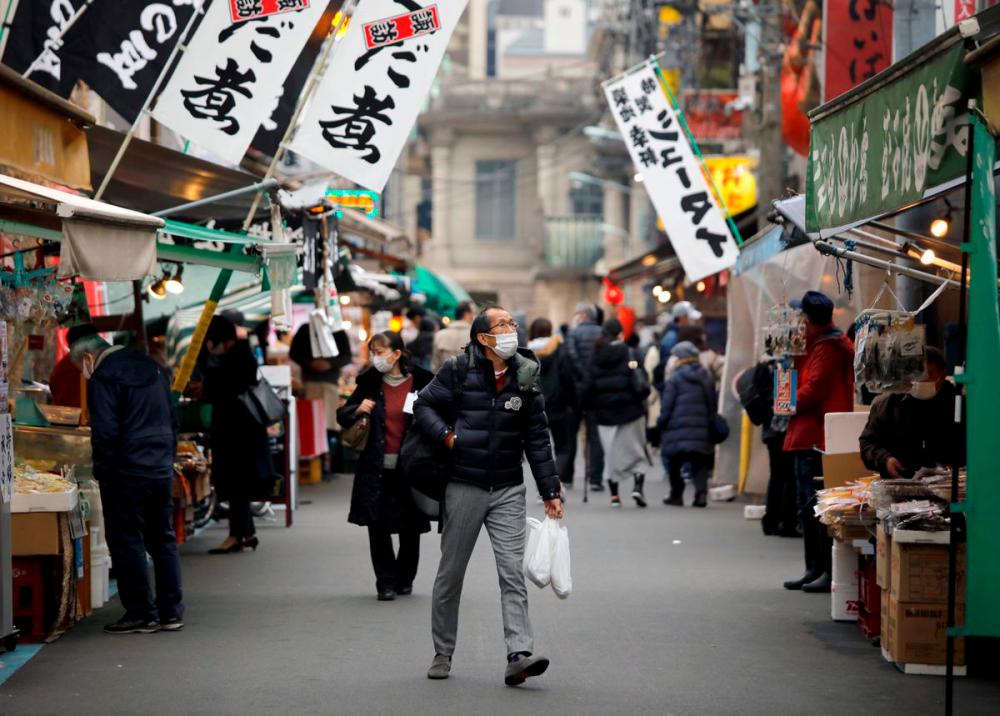TOKYO: Japan slashed its overall economic view for the first time in three months in its economic report for May due to the impact on consumption and business conditions from a coronavirus state of emergency in major areas of the country.
Authorities also repeated a warning to pay sufficient attention to the downside risk a resurgence in Covid-19 infections poses to the economic outlook.
“The economy shows increased weakness in some parts, though it continued picking up amid severe conditions due to the coronavirus,“ the government said in the report.
The government cut its assessment of the overall economy for the second time this year, after also doing so in February, which was its first downgrade in 10 months.
Among its key economic elements, authorities lowered their view of private consumption, which makes up more than half of gross domestic product (GDP).
The government said private consumption was showing weakness especially centred on services spending, which was a notch lower than the previous assessment, when it said it remained weak.
While sales of new cars and household electronics remained largely flat, average weekly spending was decreasing compared to 2017-2019 levels.
The government also lowered its view on business conditions, as a pickup showed signs of stalling, the economic report said.
Exports continued to increase moderately, while production and capital spending were picking up, all unchanged from the previous month, it said.
The world's third-largest economy likely grew at a slower-than-initially-expected pace in the current quarter due to ramifications of the coronavirus emergency curbs, following a sharp decline in the first quarter.
The government will release revised first-quarter GDP figures on June 8.
Meanwhile, Japan's government is expected to compile an extra budget in October or November, senior ruling party lawmaker Kozo Yamamoto said today, calling for spending of ¥26 trillion (RM990 billion) to cushion the economic blow from the Covid-19 pandemic.
Yamamoto, a political heavyweight close to former prime minister Shinzo Abe, also urged the Bank of Japan (BOJ) to ramp up asset buying to weaken the yen further and help the export-reliant economy.
“The BOJ must do more because Japan appears to be sliding back to deflation. Instead, the BOJ is stealth tapering asset purchases,“ Yamamoto told Reuters in an interview.
“The BOJ should seek to weaken the yen more” by boosting government bond purchases and looking for new assets to buy such as municipal and foreign bonds, he said.
Yamamoto called on the government to compile a ¥26 trillion extra budget as soon as possible to pull the pandemic-hit economy out of the doldrums, a proposal he made at a party panel headed by Abe.
Yamamoto said he submitted the proposal to Prime Minister Yoshihide Suga, but added that parliament deliberations over an extra budget will likely have to wait until an expected lower house election in autumn.
Commenting on the Olympic Games, Yamamoto said he expects Tokyo to proceed as scheduled in July even if that meant no spectators.
A former finance ministry bureaucrat, Yamamoto was considered a key architect of the former premier’s “Abenomics” reflationary policy comprised of bold monetary policy, flexible fiscal spending and reform.
Yamamoto said many successes of Abenomics were being rolled back, with Suga's administration wary of big spending and the BOJ quietly slowing the pace of money printing.
Suga on Tuesday unveiled a plan for targeted government spending as the government kicked off debate on this year's fiscal blueprint.
Markets are focusing on whether Japan will maintain a pledge to achieve a primary budget surplus in fiscal 2025, a goal seen as impossible to meet after huge pandemic-relief spending.
“There’s no need at all to stick to the primary balance target,“ Yamamoto said. “Just having the target would hurt the economy by giving markets the impression Japan is on course for fiscal austerity.” – Reuters













